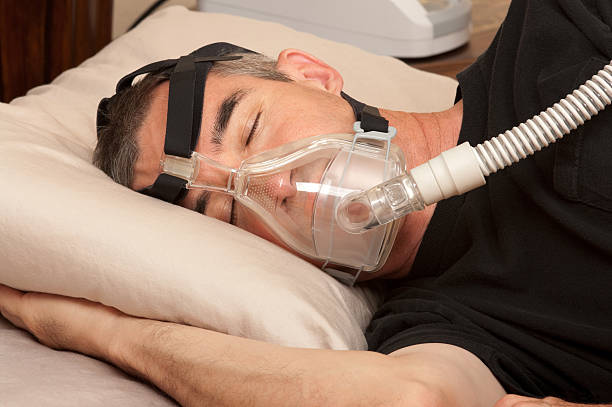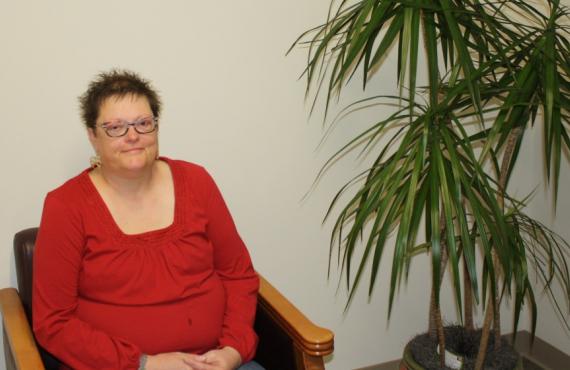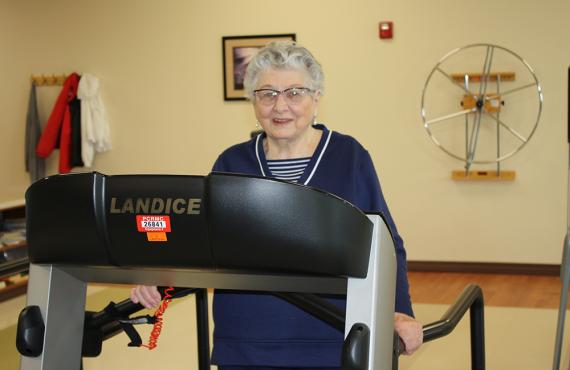Published on May 17, 2022

Read Time: 15 Minutes
Paul Hackbarth, senior content marketing specialist at Phelps Health, talks about obstructive sleep apnea with Cory Offutt, MD, a family medicine physician at Phelps Health, on The Scope podcast.
Paul Hackbarth: You're listening to The Scope, a podcast dedicated to having open conversations about healthcare topics relevant to our patients and community. Today, we're talking about obstructive sleep apnea. Let's get started. Hi, my name is Paul Hackbarth, and I will be co-hosting The Scope podcast with Paige Heitman moving forward. Today, our guest is Dr. Cory Offutt, a family medicine physician with Phelps Health. Welcome back to the show.
Dr. Cory Offutt: Thanks for having me.
Paul: You've been with us a few times, and we're glad to have you back on the podcast again. Since you have been here with Phelps Health for a little while now, why don't you tell us…about yourself?
Dr. Offutt: I came to Phelps Health almost three years ago now. I was practicing for three years previously after I got out of residency. I do broad-scope family practice, so I see everything from kids to adults, and newborns all the way up through end of life. I do all primary care preventive medicine. I've got special interests in diabetes care, sports medicine, joint injections, dermatology, ADHD (attention-deficit/hyperactivity disorder) management, obesity management, weight loss and things like that, but really anything and everything is in my scope.
Paul: It sounds like you have a variety there. No day is probably the same?
Dr. Offutt: No, it keeps the variety going.
Paul: That's good. Well, today, our topic of discussion is sleep apnea. This is actually a topic that's close to my heart as I've been recently diagnosed with sleep apnea, so I'm interested to learn more about this. Before we get into sleep apnea, can you tell us, Dr. Offutt, why is getting a good night’s sleep so important?
Dr. Offutt: Sleep feeds into everything. It affects your metabolism. It affects your energy level. It affects your mood and just your overall health in general. Without adequate sleep, there's just a lot of stress on your body. If somebody would go without sleep for an extended period of time, it could actually even be lethal without any sleep whatsoever. It plays a factor in everything. Your body needs that sleep to be able to restart, reset a bunch of different things that go on in the body and allow it to function normally.
Paul: I always hear the statistic that we sleep for basically a third of our lives. How important [sleep is] and how much of an effect that plays on our health is really interesting. So, how much sleep should we be getting each night? Does that depend on your age?
Dr. Offutt: There's actually a lot of new evidence that everybody is different on how much sleep their body really requires to function normally. Basically, your body will tell you whenever you're tired – when you need sleep. A lot of people can tell whenever they're overdoing it – burning a candle at both ends to where they're starting to be sick more because it's affecting their immune system. They're just not feeling well if they're not getting enough sleep. We've all been there. You don't sleep and you just feel lousy the next day, but it can get to the point where it will start affecting your overall health, as well. On average, most people need anywhere from six to eight hours of sleep. There are some people who need a few more hours than that. There are some people who can get by with a few less hours than that. It just varies by person.
Paul: So, it's not a cookie-cutter or a one-size-fits-all approach?
Dr. Offutt: No, definitely not. Kids growing up need more hours of sleep than adults do most of the time just because of how their metabolism works, how their physiology works and the development of different parts of their body – their brain, in particular.
Paul: There are a lot of different sleep disorders. The one we're talking about today is sleep apnea. Can you give us a definition? What exactly is sleep apnea?
Dr. Offutt: There's a couple of different types of sleep apnea. There's central and obstructive sleep apnea, and then mixed or combined sleep apnea. Basically, [sleep apnea causes] some type of a disturbance in the airway circulation between mouth and lungs that is making it difficult for your body to get the oxygen that it needs – whether that be airway constriction from asthma, COPD (chronic obstructive pulmonary disease), respiratory issues…in the upper airway, if tonsils are enlarged…if you have a lot of weight on your chest, if somebody is morbidly obese and overweight, and it can be physiologic, as well. There can be a lot of different reasons for that.
Paul: You mentioned the different types of sleep apnea. There is obstructive sleep apnea and central sleep apnea. What are the differences between those two?
Dr. Offutt: Obstructive sleep apnea [occurs when] there's something…that is actually physically causing your airways to not be able to transmit as much oxygen from your mouth down to your lungs. Central sleep apnea [occurs when] your brain's ability to actually control your respirations while you're sleeping [does not work].
Paul: That makes sense. So, is sleep apnea a pretty common condition? Do you see that a lot in your clinic?
Dr. Offutt: It's actually extremely common. There's a lot of people out there, and there are probably more undiagnosed people than they realize who are walking around with sleep apnea who don't even know it. Typically, people automatically associate snoring…with sleep apnea, which is a common symptom. But just because you snore, it doesn't mean you have sleep apnea, and just because you don't snore, it doesn't mean you don't have sleep apnea. It all is dependent on what other symptoms you have going on as well.
Paul: OK, since we're talking about symptoms…what are some symptoms of somebody who would have obstructive sleep apnea?
Dr. Offutt: The biggest one, like I said, is snoring. [Other symptoms may include] if they're waking up in the middle of the night, choking, gasping, coughing, or if…their loved one is witnessing them stopping breathing while they're sleeping. A lot of times, people are just coming in and they're saying they're tired all the time, they're falling asleep throughout the day and they need to take multiple naps throughout the day. Other things that can be symptoms of [sleep apnea include] sore throat in the morning, whenever you wake up with morning headaches…and the excessive fatigue where you're dozing off regularly.
Paul: OK, so there are different stages of sleep. Can you walk through those for us? Is sleep apnea common during certain stages?
Dr. Offutt: The best part of sleep [when] we get the most regeneration of everything in our body and allows our body to reset is whenever we get into REM sleep, or Rapid Eye Movement sleep. That’s whenever people's eyes start to twitch. That is your deepest stage of sleep, and that's also when most of your muscles are the most relaxed. So, you don't have as much support around your lungs…to keep your airways open. That's whenever obstructive sleep apnea will also become the most apparent during that stage of sleep [REM] and also the most dangerous if it is untreated. By interrupting that stage of sleep, you're not going to feel nearly as well rested, and [you may start experiencing] all of the different symptoms of sleep apnea.
Paul: Well, that makes a lot of sense. So, are certain people more or less at risk for obstructive sleep apnea? What are the risk factors that patients might have if they're more at risk for this disease?
Dr. Offutt: Being male…puts somebody more at risk [for sleep apnea]. Being overweight, obese, large neck diameters, previous history of asthma, COPD and chronic lung issues [are risk factors for sleep apnea].
Paul: That’s interesting. The neck circumference – I never really thought of that, but I guess that can make a big difference. Let's talk about some of the things that may affect obstructive sleep apnea, like sleeping pills or sleep aids. What effect do those medications have on obstructive sleep apnea?
Dr. Offutt: Whenever you're the most relaxed [and your] muscles are most relaxed, those…sleep medications would also have the same effect, along with alcohol. They just reduce your body's ability to maintain that extra support to keep airways open. Certain sedatives will affect your brain's ability to control your breathing as well. If you have untreated sleep apnea, those medications could very much exacerbate it along with alcohol.
Paul: As a provider, would you recommend that if patients do have obstructive sleep apnea, should they avoid those sleep aids or alcohol?
Dr. Offutt: If their sleep apnea is treated, then there's no rhyme or reason to avoid that stuff, but if they're having all of these symptoms, I wouldn't recommend sleep medications until they've been evaluated by [their primary care provider].
Paul: So, we talked about the symptoms of obstructive sleep apnea before. Are there any warning signs that you may have sleep apnea and just not know it? I was experiencing a lot of daytime tiredness, but I just chalked that up to stress or just long days or things like that, but actually that turned out to be sleep apnea. Are there cases like that?
Dr. Offutt: Very much so. If people are concerned about…having sleep apnea, they can even go online, and there are some different questionnaires that they can fill out themselves to see if they might meet the criteria for sleep apnea and then take [those questionnaires] with them to their primary care provider. There's the STOP-Bang Questionnaire, and then there's the Epworth Sleepiness Scale. The most common one I use in my clinic is the Epworth Sleepiness Scale, and that's going to go through and ask when you're most likely to start to doze off throughout the day – if you're sitting and reading, if you are a passenger in a car for an hour without a break or after lunch, quietly without alcohol, lying down to rest in the afternoon and things like that. Once you [answer those questions], you calculate the score, and if you're above a certain number, then the chances of you having sleep apnea are increased and you would need a sleep study. The STOP-Bang Questionnaire [looks] at different risk factors like your gender and your BMI (body mass index) that put you at greater risk. Those two things – the questionnaire and the Epworth Sleepiness Scale – combined would tell you if you're at high risk of having sleep apnea based on your symptoms and your risk factors.
Paul: I remember taking both the questionnaire and the Epworth Sleepiness Scale. What I found interesting was that [the questionnaire didn’t just ask,] “How tired are you?” [but it asked,] “How likely are you to fall asleep in those different scenarios?”
Dr. Offutt: Not even necessarily fall asleep, but you start to doze off – like your eyes are getting heavy. You don't have to full-fledged fall asleep, but [start] to doze off.
Paul: If a patient has some of these symptoms and they've talked to their doctor and filled out these questionnaires or sleepiness scales, what is the next step? What would a provider normally recommend if somebody does fit the criteria for having obstructive sleep apnea?
Dr. Offutt: Normally, they would then do a sleep study. Most insurances anymore [offer patients the opportunity to do] a home sleep study first [for] an initial sleep study evaluation for sleep apnea. So, you don't have to spend the night in the hospital for that initial test. [The initial test may show that the patient has sleep apnea and the provider may] recommend further evaluation for CPAP (continuous positive airway pressure) titration. [This is] where they then have to go into the hospital and spend a night…and they see what kind of support they need for their sleep – whether they need continuous positive airway pressure, which is your CPAP, or BiPAP (bilevel positive airway pressure), which is a little bit more significant. Usually, those [BiPAP titrations] are reserved for really bad lung issues. We don't see a lot of BiPAP, unless you have some chronic lung issues or underlying heart issues with CPAP or with sleep apnea. [Those] would be the two different tests that you'd have to do for the full-fledged diagnosis and management aspect of sleep apnea.
Paul: These different treatment options -- they call them “positive airway pressure” [machines or titrations] – can help with your breathing. Is that basically what these machines do?
Dr. Offutt: Yeah. They cause pressurized air to keep your airways open, and 99% of the time, patients come back to me and [say] even just doing the titration test in the hospital was the best sleep they've ever gotten.
Paul: Oh, really?
Dr. Offutt: It was the most well-rested they ever felt the next day because they got all the oxygen they needed. They didn't have low oxygen while they were sleeping. So, they got very restful sleep and REM sleep that wasn't interrupted by a lack of breathing. They just felt a ton better and…all of them have come back and just ranted and raved over how much better they feel after they actually get their machine at home.
Paul: That's good to hear from the patients, just to see that effect pretty quickly. So, in addition to using a CPAP machine or a BiPAP machine, are there other recommendations you might have for a patient if they have sleep apnea to help improve their breathing overnight? Are there other things besides the machine that can help? [A person’s] sleeping position – does that play a factor?
Dr. Offutt: It can very much. Some people will have to sleep sitting up a little bit more to just take some of the pressure off their chest. Weight loss or management is a big one, too, [as is] managing all their other chronic conditions and minimizing their risk factors as much as they possibly can. Also, if they have minor sleep apnea, sometimes people can get away with a mouth guard that repositions their jaw. If it's an upper airway obstruction, if they have very enlarged tonsils, then having their tonsils removed could potentially be a treatment and cure for their sleep apnea. We see that more commonly in kids with sleep apnea – it's issues with their tonsils and adenoids (tissue between your nose and back of your throat). We are seeing more kids with sleep apnea because of obesity. People don't realize how much [sleep apnea] affects your health overall because it worsens chronic medical conditions across the board. It [untreated sleep apnea] puts you at higher risk of diabetes…high blood pressure, strokes and heart attacks. It's very important to get [sleep apnea] diagnosed and treated as soon as possible.
Paul: If you are having those symptoms, you should talk to your doctor.
Dr. Offutt: Absolutely.
Paul: My last question, just to wrap this up, can sleep apnea be prevented, and if so, how?
Dr. Offutt: Minimizing those risk factors as much as you possibly can [may prevent sleep apnea]. Keep your weight in check, and then talk to your primary care provider if you have any concerns about any symptoms related to sleep apnea and make sure that you've ruled out other causes. Other than getting the sleep study, there are no formal blood tests. If you don't reach out to your provider and tell them, “Hey, I have this symptom, this symptom and this symptom,” [you won’t get diagnosed]. There's not a lot of providers [who will just say] “You have sleep apnea,” or “We need to check you for this,” unless you actually tell them about these symptoms. Don't just assume your fatigue is from not sleeping well. Are you not sleeping well because you have untreated sleep apnea and you keep waking up in the middle of the night because of that?
Paul: I like what you said about talking to your doctor and letting them know about your symptoms and going from there.
Dr. Offutt: Since we switched to our new [electronic health record] system with Epic, with MyChart access for patients online, they can send us messages in the portal and even attach their Epworth Sleepiness Scale. [They can] say, “Hey, I have these symptoms. This is what's going on.” We can even do a video visit if we need to get the sleep study ordered [so] they don't have to come into the clinic necessarily all the time. It's just gotten a lot more convenient for patients to reach out to their providers with this new system [MyChart]. It’s...better access for patients.
Paul: I totally agree. The MyChart patient portal is a great resource. It's got a lot of great features on there. Well…that will wrap up our show. Thanks again, Dr. Offutt, for stopping by and talking to us about sleep apnea.
Dr. Offutt: Thanks for having me.
Paul: Thanks for tuning into The Scope. If you liked our show and want to know more, check out phelpshealth.org.
Think You Might Have Sleep Apnea?
Talk to your primary care provider about your symptoms. If you don’t have a PCP, establish care today by calling (573) 364-9000 or visit phelpshealth.org/doctors to find a doctor today.

